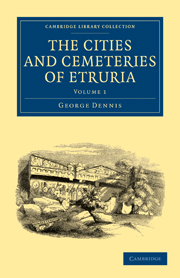Book contents
- Frontmatter
- PREFACE
- Contents
- LIST OF ILLUSTRATIONS IN VOLUME I
- INTRODUCTION
- CHAPTER I VEII.—THE CITY
- CHAPTER II VEII.—THE CEMETERY
- CHAPTER III CASTEL GIUBILEO.—FIDENÆ
- CHAPTER IV SUTRI.—SUTRIUM
- CHAPTER V NEPI.—NEPETE
- CHAPTER VI CIVITA CASTELLANA.—FALERII (VETERES.)
- CHAPTER VII FALLERI.—FALERII (NOVI)
- CHAPTER VIII FESCENNIUM
- CHAPTER IX ORTE—HORTA
- CHAPTER X FERONIA AND CAPENA
- CHAPTER XI MONTE CIMINO—MONS CIMINUS
- CHAPTER XII VITERBO.—SURRINA
- CHAPTER XIII FERENTO.—FERENTINUM
- CHAPTER XIV BOMARZO
- CHAPTER XV CASTEL D' ASSO.—CASTELLUM AXIA
- CHAPTER XVI NORCHIA.—OROLE?
- CHAPTER XVII BIEDA.—BLERA
- CHAPTER XVIII CORNETO. TARQUINII—THE CEMETERY
- CHAPTER XIX TARQUINII—THE CITY
- CHAPTER XX GRAVISCÆ
- CHAPTER XXI VULCI
- CHAPTER XXII MUSIGNANO
- CHAPTER XXIII TOSCANELLA.—TUSCANIA
- CHAPTER XXIV STATONIA
- CHAPTER XXV PITIGLIANO AND SORANO
- CHAPTER XXVI SOVANA.—SUANA
- CHAPTER XXVII BOLSENA—VOLSINII
- CHAPTER XXVIII MONTE FIASCONE—FANUM VOLTUMNÆ?
- CHAPTER XXIX ORVIETO
- Titles in the series
- Plate section
CHAPTER I - VEII.—THE CITY
Published online by Cambridge University Press: 05 July 2011
- Frontmatter
- PREFACE
- Contents
- LIST OF ILLUSTRATIONS IN VOLUME I
- INTRODUCTION
- CHAPTER I VEII.—THE CITY
- CHAPTER II VEII.—THE CEMETERY
- CHAPTER III CASTEL GIUBILEO.—FIDENÆ
- CHAPTER IV SUTRI.—SUTRIUM
- CHAPTER V NEPI.—NEPETE
- CHAPTER VI CIVITA CASTELLANA.—FALERII (VETERES.)
- CHAPTER VII FALLERI.—FALERII (NOVI)
- CHAPTER VIII FESCENNIUM
- CHAPTER IX ORTE—HORTA
- CHAPTER X FERONIA AND CAPENA
- CHAPTER XI MONTE CIMINO—MONS CIMINUS
- CHAPTER XII VITERBO.—SURRINA
- CHAPTER XIII FERENTO.—FERENTINUM
- CHAPTER XIV BOMARZO
- CHAPTER XV CASTEL D' ASSO.—CASTELLUM AXIA
- CHAPTER XVI NORCHIA.—OROLE?
- CHAPTER XVII BIEDA.—BLERA
- CHAPTER XVIII CORNETO. TARQUINII—THE CEMETERY
- CHAPTER XIX TARQUINII—THE CITY
- CHAPTER XX GRAVISCÆ
- CHAPTER XXI VULCI
- CHAPTER XXII MUSIGNANO
- CHAPTER XXIII TOSCANELLA.—TUSCANIA
- CHAPTER XXIV STATONIA
- CHAPTER XXV PITIGLIANO AND SORANO
- CHAPTER XXVI SOVANA.—SUANA
- CHAPTER XXVII BOLSENA—VOLSINII
- CHAPTER XXVIII MONTE FIASCONE—FANUM VOLTUMNÆ?
- CHAPTER XXIX ORVIETO
- Titles in the series
- Plate section
Summary
Hoc tune Veii fuêre: quæ reliquiæ? quod vestigium?
—Florus.Sic magna fuit censuque virisque
Perque decem potuit tantum dare sanguinis annos;
Nune humilis veteres tantummodo Troja ruinas,
Et pro divitiis tumulos ostendit avorum.
—Ovid. Met.OF all the cities of Etruria, none takes so prominent a place in history as Veii. One of the earliest, nearest, and certainly the most formidable of the foes of Rome—for nearly four centuries her rival in military power, her instructress in civilisation and the arts—the southern bulwark of Etruria—the richest city of that land—the Troy of Italy—Veii excites our interest as much by the length of the struggle she maintained, and by the romantic legends attending her overthrow, as by the intimate connection of her history with Rome's earliest and most spirit-stirring days. Such was her greatness—such her magnificence—that, even after her conquest, Veii disputed with the city of Romulus for metropolitan honours; and, but for the eloquence of Camillus, would have arisen as Roma Nova to be mistress of the world. Yet, in the time of Augustus, we are told that the city was a desolation, and a century later its very site is said to have been forgotten. Though re-colonised under the Empire, it soon again fell into utter decay, and for ages Veii was blotted from the map of Italy. But when, on the revival of letters, attention was recalled to the subject of Italian antiquities, its site became a point of dispute.
- Type
- Chapter
- Information
- The Cities and Cemeteries of Etruria , pp. 1 - 44Publisher: Cambridge University PressPrint publication year: 2010First published in: 1848



